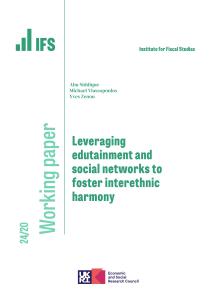In this article, we exploit the 1947 change to the minimum school-leaving age in England from 14 to 15, to evaluate the causal effect of a year of education on cognitive abilities at older ages. We use a regression discontinuity design analysis and find a large and significant effect of the reform on males’ memory and executive functioning at older ages, using simple cognitive tests from the English Longitudinal Survey on Ageing as our outcome measures. This result is particularly remarkable as the reform had a powerful and immediate effect on about half the population of 14 years olds. We investigate and discuss the potential channels by which this reform may have had its effects, as well as carrying out a full set of sensitivity analyses and robustness checks.
Authors

James Banks
CPP Co-Director
James is Senior Research Fellow and Professor of Economics at Manchester, working on broad issues in the economics of retirement, savings and health.

Fabrizio Mazzonna
Journal article details
- DOI
- 10.1111/j.1468-0297.2012.02499.x
- Publisher
- Wiley-Blackwell
- Issue
- May 2012
Suggested citation
Banks, J and Mazzonna, F. (2012). 'The effect of education on old age cognitive abilities: evidence from a regression discontinuity design' (2012)
More from IFS
Understand this issue

Sure Start achieved its aims, then we threw it away
comment
"We know that poor children grow up with poor life chances. We know how to ameliorate that. The choice is ours." Paul Johnson writes for the Times.
15 April 2024

Scottish Budget 2024-25: IFS analysis
event
22 February 2024 at 10:00
Ahead of the final Scottish Parliament vote on the Budget, IFS researchers presented their analysis of the proposals.

A mess has been made of Child Benefit, and the clear-up operation may not be easy
comment
"Status quos can be hard to change, no matter how incoherent they are." Robert Joyce writes about child benefit in The Telegraph.
29 March 2024
Policy analysis

The short- and medium-term impacts of Sure Start on educational outcomes
report
We study the medium-run effect of Sure Start on academic outcomes, finding large benefits, particularly for children from disadvantaged backgrounds.
9 April 2024

Sure Start greatly improved disadvantaged children’s GCSE results
press release
New research from IFS finds that Sure Start generated big improvements in the educational performance of children from low-income backgrounds.
9 April 2024

What you need to know about the new childcare entitlements
comment
This comment looks at who will be eligible for free childcare, whether funding is high enough and what impact the new entitlements might have.
28 March 2024
Academic research

Higher Education Access and Funding: challenges and policy options
conference
14 May 2024 at 11:00
This one-day academic conference looked at access to and funding of Higher Education systems.

Forced displacement, mental health, and child development: Evidence from Rohingya refugees
working paper
In this study, we conducted a cluster randomized controlled trial (RCT) involving 3,500 Rohingya mother-child pairs in refugee camps in Bangladesh.
10 May 2024

Leveraging edutainment and social networks to foster interethnic harmony
working paper
Using a cluster-randomised field experiment, this paper investigates the effectiveness of educational entertainment in promoting interethnic harmony.
10 May 2024